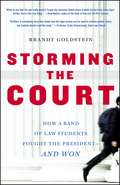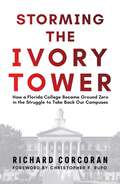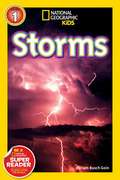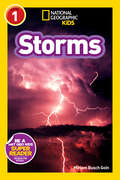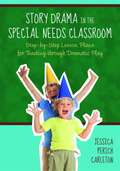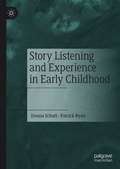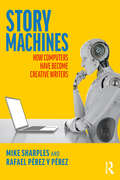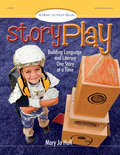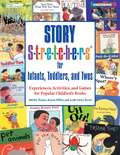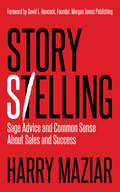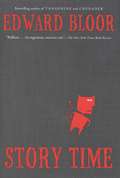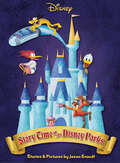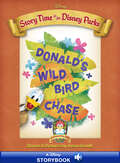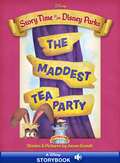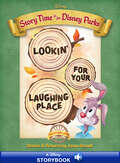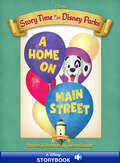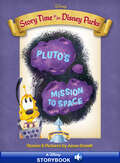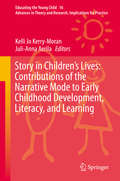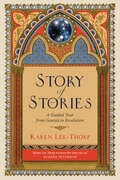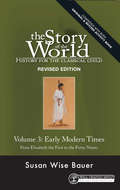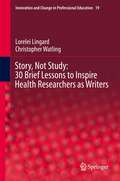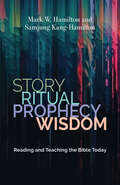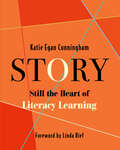- Table View
- List View
Storming the Court: How a Band of Yale Law Students Sued the President--and Won
by Brandt GoldsteinThe David vs. Goliath story of the unflagging Yale Law School students who in 1992 fought the U.S. Government all the way to the Supreme Court.In 1992, three hundred innocent Haitian men, women, and children who had qualified for political asylum in the United States were detained at Guantánamo Bay, Cuba—and told they might never be freed. Charismatic democracy activist Yvonne Pascal and her fellow refugees had no contact with the outside world, no lawyers, and no hope...until a group of inspired Yale Law School students vowed to free them. Pitting the students and their untested professor Harold Koh against Kenneth Starr, the Justice Department, the Pentagon, and Presidents George H. W. Bush and Bill Clinton, this real-life legal thriller takes the reader from the halls of Yale and the federal courts of New York to the slums of Port-au-Prince and the windswept hills of Guantánamo Bay and ultimately to the U.S. Supreme Court. Written with grace and passion, Storming the Court captures the emotional highs and despairing lows of a legal education like no other—a high-stakes courtroom campaign against the White House in the name of the greatest of American values: freedom.
Storming the Ivory Tower: How a Florida College Became Ground Zero in the Struggle to Take Back Our Campuses
by Richard CorcoranA firsthand account of how Richard Corcoran, former education commissioner of Florida, successfully took on powerful progressive interest groups, broke their monopoly, and paved the way for higher education reform across America.Covid alerted the nation to the reality that K-12 schools—private and public alike—were infested with ideologues bent on indoctrinating children. Then, three years after the beginning of the pandemic, the shocking response to Hamas&’s genocidal assault on Israel made Americans aware that the same tumor had wholly sickened our country&’s colleges and universities. Now, conservatives—and increasingly, moderates and old-school liberals—want to know exactly how the radical left captured higher education. Florida has been the vanguard in the war to restore sanity to higher education. And Richard Corcoran has been one of its commanding generals—and racking up wins. When Corcoran was Florida&’s education commissioner, he was the point person for reopening schools and banning mask mandates. He triumphed. Then, he was given a herculean task: remaking a college overrun by radicalism and cancel culture. In 2023, he moved into the president&’s office in Sarasota, took on a campus mob, and challenged a media firestorm. Just a year later, Corcoran achieved the seemingly impossible. He turned around New College of Florida. Now, free speech is protected. Violence and anti-Semitism are abolished. DEI bureaucracy is eliminated. And, already, enrollment records are being broken. Storming the Ivory Tower is the story of how Corcoran is winning the fight for freedom in hostile territory, and how others can join the battle.
Storms (National Geographic Kids Readers #Level 1)
by National Geographic Kids Staff Miriam GoinIn a haboob, camels shut a second pair of eyelids to protect their eyes from sand. Their long, thin nostrils and extra hairy ears keep sand out. In monsoon rains, some monkeys keep dry in buildings or under branches. Other monkeys don't mind getting wet.
Storms (Readers)
by Miriam Busch GoinStorms are SCARY! But it&’s cool to understand what&’s going on when Mother Nature gets angry. Why does the wind howl? Why does it rain for days? How do rivers overflow? Thunder and lightening, monsoons, hurricanes, tornadoes... the facts and photos in this book will blow you away!
Story Listening and Experience in Early Childhood
by Patrick Ryan Donna SchattThis book shows connections between oral story listening and unique, enduring educational effects in and outside of the classroom. Using scientific studies and interviews, as well as personal observations from more than thirty years in schools and libraries, the authors examine learning outcomes from frequent story listening. Throughout the book, Schatt and Ryan illustrate that experiencing stories told entirely from memory transforms individuals and builds community, affecting areas such as reading comprehension, visualization, focus, flow states, empathy, attachment, and theory of mind.
Story Machines: How Computers Have Become Creative Writers
by Mike Sharples Rafael Pérez y PérezThis fascinating book explores machines as authors of fiction, past, present, and future. For centuries, writers have dreamed of mechanical storytellers. We can now build these devices. What will be the impact on society of AI programs that generate original stories to entertain and persuade? What can we learn about human creativity from probing how they work? In Story Machines, two pioneers of creative artificial intelligence explore the design and impact of AI story generators. The book covers three themes: language generators that compose coherent text, storyworlds with believable characters, and AI models of human storytellers. Providing examples of story machines through the ages, it covers the history, recent developments, and future implications of automated story generation. Anyone with an interest in story writing will gain a new perspective on what it means to be a creative writer, what parts of creativity can be mechanized, and what is essentially human. Story Machines is for those who have ever wondered what makes a good story, why stories are important to us, and what the future holds for storytelling.
Story Play: Building Language and Literacy One Story at a Time
by Mary Jo HuffWhen a story comes to "The End" it does not have to be the end of the story. Instead, teachers can continue the learning with activities and experiences to promote conversation about that story. Story Play encourages even the most inexperienced teacher, librarian, child care professional, or family member to become a storyteller with ideas for expanding stories into meaningful learning experiences. With stories, poems, songs, chants, and fingerplays, as well as ideas for working with puppets and props, Story Play brings all the fun of storytelling into the classroom in new ways. These easy-to-follow ideas focus on literacy skills and are perfect for engaged, active learning.
Story S-t-r-e-t-c-h-e-r-s for Infants,Toddlers and Twos: Experiences, Activities, and Games for Popular Children's Books
by Karen Miller Shirley Raines Leah Curry-RoodIt's never too early to read to a child, especially when you have Story S-t-r-e-t-c-h-e-r-s! The youngest children love the repetition of words and experiences that stories provide. Story S-t-r-e-t-c-h-e-r-s contains 80 age-appropriate children's books and 240 ways to s-t-r-e-t-c-h the stories in new ways to enhance the learning process. Organized by age, this book is a wonderful addition to the Story S-t-r-e-t-c-h-e-r-s series, offering new ways for young children to experience the magic of a good book. Children reap amazing benefits from being exposed to reading at an early age, and Story S-t-r-e-t-c-h-e-r-s makes reading with infants, toddlers, and twos an adventure in learning and fun! - See more at: https://www.gryphonhouse.com/books/details/story-s-t-r-e-t-c-h-e-r-s-for-infants-toddlers-and-twos#sthash.Sc45HfFn.dpuf
Story S-t-r-e-t-c-h-e-r-s for the Primary Grades, Revised: Activities to Expand Children's Books, Revised Edition
by Brian Scott Smith Shirley RainesThere is nothing that children love more than a good story. Story S-t-r-e-t-c-h-e-r-s for the Primary Grades, Revised connects 90 of the best children's books to early learning centers, stretching each story five ways with lively and entertaining activities that heighten reading readiness, sharpen comprehension skills, and expand the excitement of story time. Pulling the best stories from the original books, this new edition also features new children's books as well as old favorites, refreshed activities, and online references for expanding story experiences.
Story Selling: Sage Advice and Common Sense About Sales and Success
by Harry MaziarStory Selling is a series of fun stories and selling lessons that are entertaining and effective. It is a valuable handbook for sales managers and representatives. It is a teaching (not a preaching) tool that is humorous, instructive and memorable. The repeatable stories impart self-assurance and confidence.
Story Time
by Edward BloorGeorge and Kate are promised the finest education when they transfer to the Whittaker Magnet School. It boasts the highest test scores in the nation. But at what price? Their school's curriculum is focused on beating standardized tests; classes are held in dreary, windowless rooms; and students are force-fed noxious protein shakes to improve their test performance. Worst of all, there seems to be a demon loose in the building--one whose murderous work has only just begun.A bitterly funny satire about the state of modern education from the author of Tangerine and Crusader. Includes a reader's guide and an author's note.
Story Time in the Disney Parks
by Jason GrandtOriginal illustrated stories for kids based on the attractions in Walt Disney World's Magic Kingdom
Story Time in the Parks: Adventureland: Donald’s Wild Bird Chase
by Disney Book GroupRead along with Disney! Ace photographer Donald Duck is on a special expedition! Commissioned by Rare Birds magazine, he is on a mission to find and photograph the rare and mischief Aracuan Bird. Follow along as he traverses through Adventureland for this prankster bird.
Story Time in the Parks: Fantasyland: The Maddest Tea Party
by Disney Book GroupRead along with Disney! It's another merry unbirthday in Wonderland, but March Hare and Mad Hatter are feeling a bit unsatisfied with their usual teacups. In attempt to make them larger and grander, havoc wreaks instead. With the help of Cheshire Cat, follow along as the two try to correct their mistakes.
Story Time in the Parks: Frontierland: Lookin’ For Your Laughing Place
by Disney Book GroupRead along with Disney! It's a day of the Blues for Brer Bunnie and he doesn't feel like doing much. Will Brer Papa be able to help him find his Happy Place? Follow along with word for word narration as Brer Papa helps his son bounce back from the Brer Blues.
Story Time in the Parks: Main Street USA: A Home on Main Street
by Disney Book GroupRead along with Disney! One day, a little puppy with nowhere to go arrived at the Main Street USA train station. Seeking for a place to call his own, follow along as the little pup explores the town in order to find the perfect home.
Story Time in the Parks: Tomorrowland: Pluto’s Mission to Space
by Disney Book GroupRead along with Disney! Mickey is working in outer space and Minnie wants to space-mail him Gingerbread Robots. But when the mischievous Chip and Dale snatch Pluto's cookie delivery away, it's up to Pluto to save the day and make sure the cookies make it safe and sound to Mars.
Story in Children's Lives: Contributions of the Narrative Mode to Early Childhood Development, Literacy, and Learning (Educating the Young Child #16)
by Kelli Jo Kerry-Moran Juli-Anna AerilaThis book is based on the power of stories to support children in all areas of their lives. It examines the role narratives can play in encouraging growth in contexts and domains such as personal and family identity, creative movement, memory and self-concept, social relationships, or developing a sense of humor. Each chapter describes innovative and research-based applications of narratives such as movement stories, visual narratives to develop historical thinking, multimodal storytelling, bibliotherapy, mathematics stories, family stories, and social narratives. The chapters elaborate on the strength of narratives in supporting the whole child in diverse contexts from young children on the autism spectrum improving their social skills at school, to four- and five-year-olds developing historical thinking, to children who are refugees or asylum-seekers dealing with uncertainty and loss. Written by accomplished teachers, researchers, specialists, teaching artists and teacher educators from several countries and backgrounds, the book fills a gap in the literature on narratives. “…this work delves into the topic of narratives in young children’s lives with a breadth of topics and depth of study not found elsewhere.” “Collectively, the insights of the contributors build a convincing case for emphasizing story across the various disciplines and developmental domains of the early childhood years.” “The writing style is scholarly, yet accessible. Authors used a wide array of visual material to make their points clearer and show the reader what meaningful uses of story “look like”.” Mary Renck Jalongo, Journal and Book Series Editor Springer Indiana, PA, USA
Story of the World, Vol. 3: Volume 3: From Elizabeth The First To The Forty-niners Revised Edition (Story of the World #11)
by Susan Wise BauerA beautifully revised edition of the classic world history for children. Now more than ever, our children need to learn about the people who live all around the world. This engaging guide to other lands weaves world history into a storybook format. Designed as a read-aloud project for parents and children to share (or for older readers to enjoy alone), this book covers the major historical events in the years 1600-1850 on each continent, with maps, illustrations, and tales from each culture. Over 1.3 million copies of The Story of the World have been sold. Newly revised and updated, THE STORY OF THE WORLD, VOLUME 3 includes a new timeline, 40 brand-new illustrations, and a pronunciation guide for unfamiliar names, places, and terms.
Story, Not Study: 30 Brief Lessons to Inspire Health Researchers as Writers (Innovation and Change in Professional Education #19)
by Lorelei Lingard Christopher WatlingMany researchers dread writing. They find it laborious - even painful - to put their scholarly work into words. They get bogged down in the study, and lose track of the story. And they produce uninspiring papers that fail to resonate with readers or reviewers. This book offers an antidote to this problem: brief, accessible lessons that guide researchers to write clear and compelling scientific manuscripts. The book is divided into three sections – Story, Craft, and Community. The Story section offers advice on getting the balance of study and story just right, introducing strategies for tackling each section of a scientific manuscript. The Craft section considers the grammatical and rhetorical tools of the trade, showing how they can be wielded for maximum impact. And the Community section offers suggestions for writing collaboratively, supporting other writers, and navigating peer review. Each section features multiple short and pragmatic lessons, peppered with illustrative examples. Readers can use the chapters collectively to build holistic writing skills, or dip in and out to refine specific elements of the craft. Rooted in a coaching philosophy, we aim to unlock our readers’ potential as writers through instruction, reflection, and example. And we hope to inspire researchers to face writing with joy. This work is clearly written and easily understandable. Its many practical examples, tools, and exercises make an effective toolbox of support for scholarly writers. This will be invaluable to new scholars and help established scholars as well. The inclusion of examples specific to the health arena and the clear, elegantly simple explanations add strength and relevance to this work.Toni Ungaretti, Johns Hopkins School of Education, Baltimore, MD, USA This book is the most original perspective I have ever read about the craft of writing. As its title suggests, it is inspiring. Brownie Anderson, NBME, Philadelphia, PA, USA
Story, Ritual, Prophecy, Wisdom: Reading and Teaching the Bible Today
by Mark W. Hamilton Samjung Kang-HamiltonDiscover how studying the Bible can renew your church community. How do we teach the Bible in a way that makes a real difference in our students&’ lives and our communities? Too often, biblical introductions treat Scripture as a mere historical artifact. Mark W. Hamilton and Samjung Kang-Hamilton combine their decades of experience in theological and religious education to devise a new way to teach Scripture that brings out its life-giving qualities. The authors show how Scripture has four modes: story, ritual, prophecy, and wisdom. With an eye toward spiritual formation, the authors explore examples of each of the four genres within the Bible and show how they address real needs in the life of the church today. They also recommend how to incorporate contemporary tools like digital media alongside art, music, and other practices to draw wisdom from Scripture. Combining multicultural sensitivity with ecumenical spirit, this guidebook is ideal for educators and pastors seeking to renew their own Christian communities through biblical education.
Story: Still the Heart of Literacy Learning
by Katie CunninghamStories are all around us. From our digital newsfeeds, interactions with one another, to watching a movie or listening to a curated playlist, we see and hear different tales told to us in various ways.In her book, Story: Still the Heart of Literacy Learning, author and teacher Katie Egan Cunningham reminds us that when we bridge reading strategies with the power of story, we can deepen literacy learning and foster authentic engagement with students. Cunningham shows how to create classrooms of caring and inquisitive readers, writers, and storytellers. Inside you'll find: How to build a diverse, multicultural classroom library that reflects all voices through rich, purposeful, and varied textsNumerous examples of multi-genre and multi-modal stories from children's and young adult literatureA practical toolkit at the end of each chapter to demonstrate how to make stories come alive in any classroom Throughout the book, Cunningham shares her experiences as a teacher, literacy specialist, and staff developer and how building and talking about stories brings them to life. She honors the importance of teaching strategies to read different kinds of text, to write across genres, and to speak and listen with purpose while reminding us about the importance of story.
